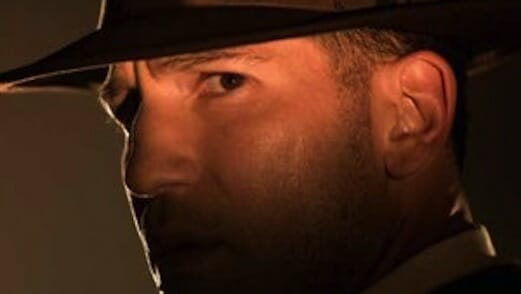
The best possible description of TNT’s new gangland drama Mob City is the phrase “L.A. Noir.” Lucky for me, I didn’t have to think that one up myself; it was the show’s title during development, and at some point the choice was made to switch to the more generic “Mob City.” Based on real accounts from the LAPD of crime in the late ‘40s, and created by Frank Darabont (The Shawshank Redemption), the series centers on Joe Teague, a former marine and current cop played by Joe Bernthal (Shane from The Walking Dead). Bernthal carries himself with less intensity than he found appropriate in the zombie apocalypse, instead adopting the gruff, silent-when-not-wisecracking persona we’ve seen in a thousand other period crime pieces. The problem here is most of the show’s choices feel equally predictable, and the overall impression is of a drama cobbled together from the parts of dimly remembered noir clichés. We’re only one episode in, but already a lack of originality casts doubt on the ultimate success of the show; the dialogue, the setting, and the plot twists feel re-hashed. Worse, they feel boring.
Ironically, the first episode is called “A Guy Walks Into a Bar”—six words that serve as a sure signpost that you’re about to hear an old, tired joke. And the opening scene doesn’t disappoint; three young men, hair brilliantined and suits flawless, approach a street where a series of trucks are about to transport booze. This is Prohibition, and the violin case each man carries obviously alerts the watchmen to the fact that they might be carrying machine guns. The tension mounts as the men are forced to open the cases at gunpoint. But, surprise, those are actual violins, and the men play on the street (beautifully) as the watchmen eye them warily. A woman pushing a stroller stops by momentarily (callback to The Untouchables, by the way), and after she drops a coin into one of their cases, she leaves without taking her stroller. Suddenly, the three violinists reach into the stroller, and—voila!—machine guns. They proceed to blast everyone in the vicinity to kingdom come, and the pay-off is that these three men are Bugsy Siegel, Meyer Lansky and Sid Rothman in their youth.
After reading that, you might have some questions. Such as:
1. Why did they bother with the violins in the first place? (Who knows.)
2. Could Siegel and Lansky, real-life mobsters, actually play violin? (No.)
3. How did the gorgeous woman with the stroller find herself near the scene of the crime late night in a deserted part of the city without attracting suspicion? (Ummm…)
Scenes like these are always frustrating because they signify a group of writers attempting to be clever rather than intelligent. You can almost imagine their self-satisfaction, or the surprised reaction of more gullible viewers: “OH MY GOD, THE VIOLIN PLAYERS WERE THE BAD GUYS AFTER ALL!” It’s sloppy work, designed to lead you on a surprise road but feeling more like circling the same roundabout over and over.
The action fast-forwards to 1947 Los Angeles, but the quality doesn’t evolve. There’s lots of jazz and clipped dialogue and somber voiceover narration (“I live in a world of gray hats,” Bernthal intones, after a long tangent about how hats symbolize good and evil), but it never adds up to anything compelling. Teague receives an envelope in his mailbox which directs him to a meeting at a bar. There, a hack comedian with the name Hecky Nash (Simon Pegg, slightly less brilliant than usual here) offers him $1,000 to watch his back when he meets with Sid Rothman and another gangster to exchange photographic negatives for money. It’s a dangerous game of blackmail, and he knows having a moonlighting cop behind him will make things easier.
Teague takes the deal, but when he pulls Nash’s file at the police station, the head detective (another Walking Dead vet, Jeffrey DeMunn) catches him, and Teague is forced to pretend he was going to bring the case in all along. Nash arranges a meeting in an oil field with Rothman and his gunman, and because the cops can’t set up anywhere close, Teague brings a flare gun to signal them with if things go bad. Things don’t go bad—Nash’s plan was solid, and he gets the money and exchanges the negatives.
But then, guys, ANOTHER TWIST! Teague shoots him in the back, takes the money, wipes the prints off his gun, and shoots the flare. In the closing scene, back at the bar, he meets with his former Marine pal who now works as a mob lawyer and set him up with Nash in the first place. But Teague doesn’t want Bugsy Siegel’s money; he gives it back. The lawyer want to know why he killed Nash if he didn’t want the money, and so do we, but all Teague will say (in voiceover, of course) is that the only reason to murder anyone is “for love.” This monologue is accompanied by the image of Nash’s wife waiting for him with packed bags, but it’s unclear whether Teague has a relationship with her. And if not, what the hell does he mean by love?
There are lots of tricks and shortcuts in Mob City, and I’m sure the period details are exact. What it lacks, unfortunately, is heart and brains. When Teague shot Nash, I couldn’t help remember the pilot episode of The Shield, when Vic Mackey shoots his fellow cop because he knows he’s a mole. Where that sudden turn felt shocking and rewarding, and drew the viewer into the series like a magnet, the Mob City equivalent was silly and confusing. Maybe you’ll like the glitz and baubles of ‘40s LA, but if you’re looking for real artistry, or even a good story, you’ll be frustrated. Like a two-bit mobster who fails his famiglia, this show should never have been made.